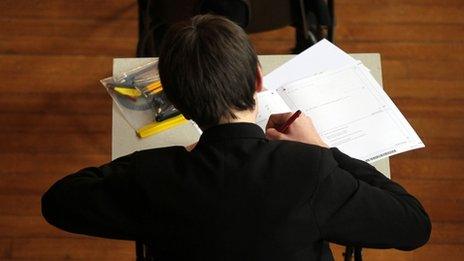Top GCSE grade to be given to just 3% in English and maths
- Published
- comments

Just 3% of England's GCSE papers will be awarded the new ultra-high grade when new-style GCSE exams for English and maths are first sat in 2017.
The shake-up will see a shift to a numerical system from the highest Grade 9 to Grade 1, with the three top grades replacing the present A and A*.
Exam regulator Ofqual said the move was in response to calls for greater differentiation at the top end.
Head teachers say students must not be disadvantaged by the change in grading.
Chief regulator Glenys Stacey said the approach to grading would draw heavily, in the first year, on "statistical evidence to make sure that there are clear 'anchor points' from the old system to the new".
She added: "This will make sure that the year group of students are not disadvantaged, or advantaged, because of the introduction of the new qualifications, and will provide some certainty about what to expect at this time of significant change."
Schools will begin teaching the new GCSEs in English, English Literature and maths in September 2015.
'Hard-wiring'
Under the plans, roughly the same proportion of students as have achieved a Grade C will be awarded a new Grade 4.
Ms Stacey said the regulator was "hard-wiring the Grade C boundary to the Grade 4 boundary".
"It's very important we have at least one anchor point between the old and the new," she said, adding that this would enable further education colleges to identify those students who were expected to gain an all important Grade C in their core GCSEs.
The new approach will also mean:
- Broadly the same proportion of students will achieve a Grade 7 or above as currently achieve an A and A*
- For each examination, the top 20% of those who get Grade 7 or above will get a Grade 9
- The bottom of Grade 1 will be aligned with the bottom of Grade G
However, former Education Secretary Michael Gove has been clear he wants the new GCSEs to be tougher than the current exams.
And there have been clear signals from government that the benchmark for what is often referred to as a "good GCSE", will be higher than the current Grade C.
The Ofqual consultation on the proposals quotes a letter from Mr Gove making this call last February.
"At the level of what is widely considered to be a pass (currently indicated by a Grade C), there must be an increase in demand, to reflect that of high-performing jurisdictions," he wrote
Ofqual added: "We proposed that the standard of performance for a Grade 5 should align to the expected standard for similar qualifications or exams taken in high-performing jurisdictions."
It added that the new Grade 5 would be positioned to cover the top third of marks for a current Grade C and the bottom third of marks for a Grade B.
This would mean Grade 5 is set at about half or two-thirds of a grade higher than the current Grade C - which is the standard currently used for school league table measures.
International results
This would be broadly in line with the performance of countries such as Finland, Canada, the Netherlands and Switzerland, it added.
But the government has yet to confirm where it will position the benchmark for school accountability under the new system.
The new GCSEs are currently being accredited by Ofqual, and Ms Stacey said she expected syllabuses for English and maths would be with schools this term.
General secretary of the Association of School and College Leaders Brian Lightman said the success of the reforms depended on their implementation.
"Harder exams in themselves do not lead to higher standards. Excellent teaching and clear leadership are what enable students to achieve more," he said.
"Students must not be disadvantaged by the change in grading.
"What is important is that Ofqual sets out very clearly to teachers and students what is needed to achieve a specific grade.
"This is not the same as simply describing what statistical proportion of pupils will achieve a grade.
"Employers need a clear message that if a student has achieved a particular grade, it means that they have a certain skill or knowledge level."
- Published3 April 2014
- Published11 September 2014